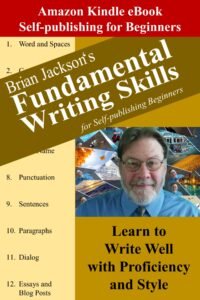The following are words that are confused by using one word in place of the other. Make sure you don’t make these obvious mistakes while you’re writing.
Note: The following is an excerpt from Fundamental Writing Skills for Self-publishing Beginners.
“a” and “an”
Use the words “a” and “an” to indicate any one of a group of choices. Use a when the choice begins with a hard-consonant sound and an when the word begins with a vowel sound. For example:
I bought a ball.
I ran a mile.
I stepped on an ant.
I inserted an s.
Note in the last example that an is used instead of a because the word following has a vowel sound, even though it begins with a consonant.
“there”, “their” and “they’re”
Use the word “there” to indicate a location, as in “the ball is over there”. Use the word “their” to indicate possession as in “it turns out it was their ball”. Use “they’re” as a contraction of the phrase “they are”.
“fewer” and “less”
Use “fewer” to indicate a reduction in countable items and “less” to indicate a reduction in non-countable items. For example:
There are fewer cubes of ice in my drink than yours.
There is less water in my glass than yours.
In the first example, cubes of ice are countable, so you use the word fewer with that expression. In the second example, water is not countable, so you would use the word less to indicated that one glass contains reduced water.
“vein”, “vane” and “vain”
Use the word “vein” to indicate a tube in your body used to pass blood or a seem of ore. Use the word “vane” to indicate a weather vane. Use the word “vain” to indicate a hopeless situation or someone who is self-impressed. For example:
Blood flows from one vein to another.
We follow the vein of gold until it ran out.
Which way is the weather vane pointing?
You’re so vain!
I tried in vain to improve my skating.
“then” and “than”
Use “then” to express a time and “than” to express comparison. For example:
Then we went to the party.
I’m taller than you.
The first example uses “then” to designate when we went to the party. The second example uses “than” to compare heights.
“through” and “threw”
Use the word “through” to indicate the passage from one side of something to the other or completion of a task. Use the word “threw” as the past tense of throw. For example:
I passed through the portal.
I’m through with him.
I threw the ball to Marty.
“bear” and “bare”
Use the word “bear” to describe the animal and the word “bare” to indicate naked or to expose something. For example:
The bear lives in the woods.
My feet are bare without socks and shoes.
It was time to bare my soul.
The expression “bare my soul” is used to indicate exposure of one’s innermost values.
“me” and “I”
Another common misuse is of the words “me” and “I” when using them in a conjunction. For example, which of the following is correct.
Randy went to the movies with Jodie and I.
-or-
Randy went to the movies with Jodie and me.
To discover the answer, simply remove the other half of the conjunction to see which works as in these rewrites:
Randy went to the movies with I.
-or-
Randy went to the movies with me.
The second sentence is clearly the correct one and is therefore also the correct choice in the above conjunction example.
The same is true of this sentence:
Jeff and I ran to school.
This sentence is correct because the following is correct:
I ran to school.
“good” and “well”
The simplest way to differentiate the use of “good” and “well” is to recognize that “good” is an adjective used to describe a noun and “well” is an adverb describing an action. For example:
You do a good job.
You do a job well.
In the first example, “good” is describing the job, which is a noun. In the second case, “well” is describing how you did the job; therefore, the adverb form is correctly used.
“whose” and “who’s”
To remember this, I always need to flash the “Whose Line Is It Anyway?” logo before my eyes, then I remember: Use “whose” for ownership and “who’s” as a condensation of the phrase who is.
I’ll see you in the classroom,
—Brian


















